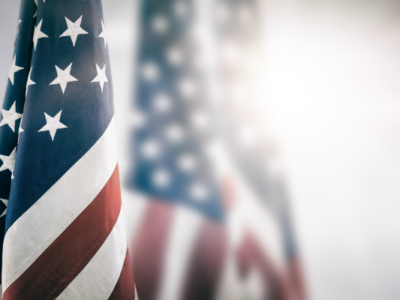The Rule of Law a Cornerstone of Our Nation Worth Preserving

July 6, 2020
By David L. Walker, Jr.
This article was published in the Cherokee Tribune & Ledger News on July 4, 2020: Tribune Ledger News – FROM THE BENCH & BAR.
As the U.S. celebrates 244 years of existence, it is prudent to reflect upon some of its founding principles. The Founding Fathers understood the unique weight of their monumental endeavor, and on that topic, Thomas Jefferson once wrote, “no experiment can be more interesting than that we are now trying, and which we trust will end in establishing the fact, that man may be governed by reason and truth.”
When the Continental Congress issued the Declaration of Independence on July 4, 1776 and proclaimed, “we hold these truths to be self-evident, that all men are created equal, that they are endowed by their Creator with certain unalienable Rights, that among these are Life, Liberty, and the pursuit of Happiness,” the concept was not fabricated from thin air; rather, the notion that individuals are born with fundamental natural rights that are granted by God and not dependent upon the consent of a sovereign was a philosophy that had been cultivated for centuries.
Through the birth of the U.S. and the words of the Declaration of Independence we find the first instance in which a nation was chartered on the principle that individuals are created with unalienable rights and that “Governments are instituted among men, deriving their powers from the consent of the governed.” That declaration was revolutionary in every sense of the word, and it became the cornerstone of our nation.
The Rule of Law is another fundamental tenet of America’s founding that was established to reconcile the authority of the government to promulgate laws with the primacy of protecting the unalienable rights of its citizens. In its most basic form, the Rule of Law requires that for a law to be legitimate, it must: be established in advance (i.e., not instituted retroactively), be made in public, be clear and unambiguous, be capable of certain and consistent enforcement, and be enforced equally among all citizens. The Rule of Law prohibits government officials from arbitrarily abusing their office or authority to wield power in abrogation of the law.
Against this backdrop, government officials are best able to maintain their legitimacy by jealously protecting and adhering to the Right of Due Process. In general terms, the Right of Due Process, which is acknowledged in the Fifth and 14th Amendments, prohibits the government from arbitrarily interfering with a citizen’s life, liberty, or property. The concept of Due Process embodies the notion of legal fairness, and it mandates that government officials cannot abuse their positions of power to capriciously encumber a citizen’s liberty or property for their own gain. Similarly, where a government official refuses to carry out a duty of his or her office to protect an individual’s life, liberty, or property from being assailed by another, he or she has also failed to uphold the Rule of Law.
The Rule of Law is indispensably interwoven into the social contract that binds citizens to their government and to each other, and it is relevant to even the most seemingly mundane interactions. For instance, each State has laws that govern the interpretation and enforcement of contracts, and every individual who engages in a business transaction, enters into that transaction with the understanding the parties will be obligated to act in accordance with the law and that he or she will have a legal remedy if the other party violates that law.
So long as law abiding citizens are reasonably confident that their rights under the law will be uniformly protected and not subject to arbitrary enforcement or nonenforcement, they will continue to rely upon the Rule of Law to govern their conduct. Conversely, in situations where the Rule of Law is not enforced, a substantial decline in economic activity can result, because individuals are generally unwilling to take on the risk of financial investment if the rules governing their activity are unpredictably or inequitably enforced. Moreover, where government officials refuse to uphold the Rule of Law, citizens’ confidence that they are equally protected under the law will be undermined, and in such event many will conclude that they must rely upon their own means and methods to protect their families, businesses, and property.
In every instance where a governmental authority allows any individual or group of individuals to advance its interests by trampling upon the liberty, life, and property of others, the principles of due process and the Rule of Law are eroded. Ultimately, this can operate to unwind the social contract that has operated for almost 250 years to govern the peaceable interactions of citizens with their government and with each other. History shows us the consequences of a breakdown in the social contract can be disastrous. As this Nation turns another year older, it is important for all to remember the importance of the Rule of Law and recommit to upholding its integrity.
David L. Walker, Jr. is a partner with Flint, Connolly & Walker, LLP. He focuses his legal practice to collaborate with business owners, mid-sized and closely held corporations, as well as real estate owners, developers, and contractors.
